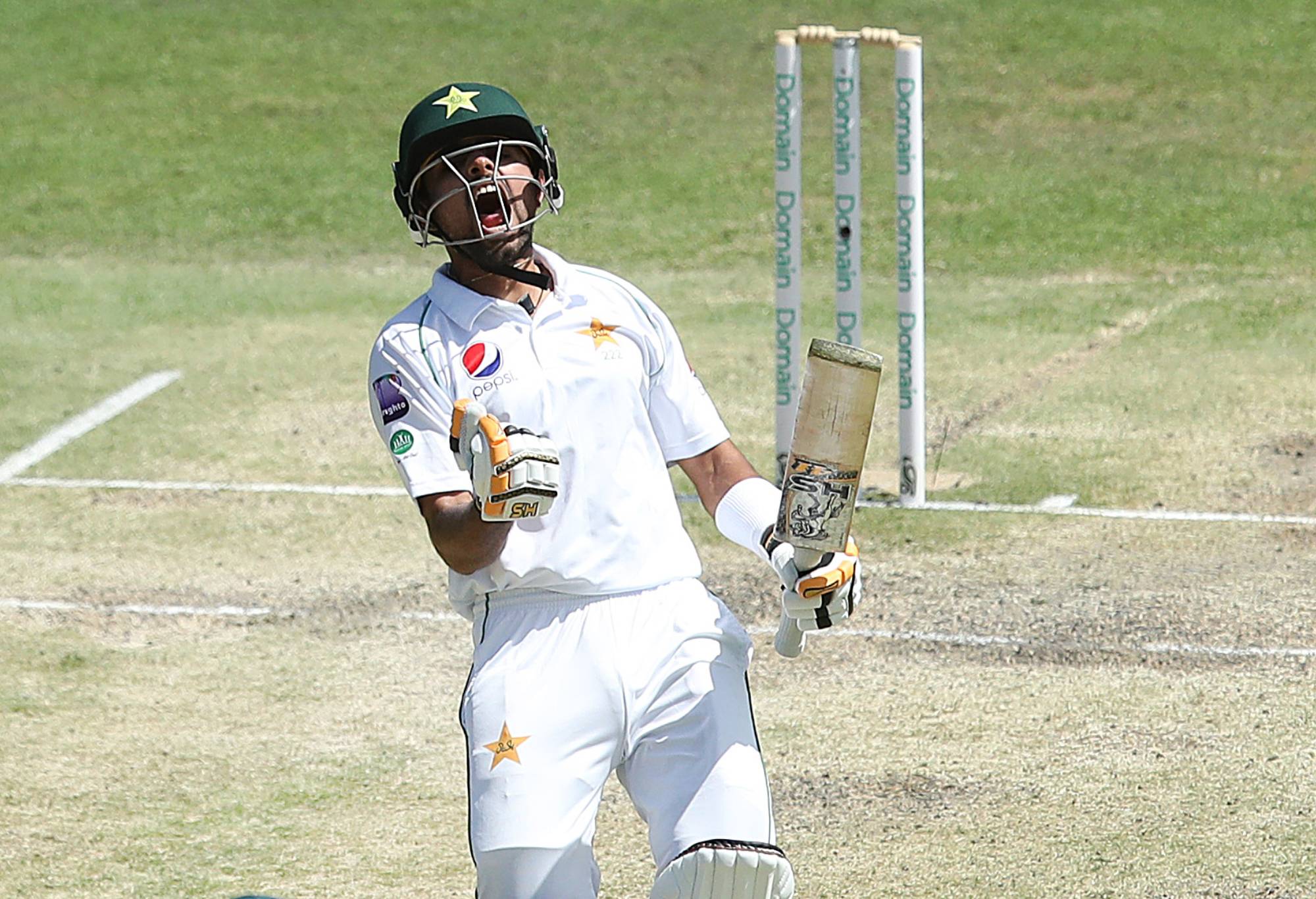Gardner smashes run-a-ball maiden century as Aussies on verge of retaining Ashes
Australia are on the verge of retaining the women's Ashes after Ashleigh Gardner's maiden international century set up an 86-run win over England. The…

In 1930, as England braced for Don Bradman’s brilliance, Percy Fender wrote ‘How to Deal with Bradman’ for The Observer.
It was a brave, if futile, attempt to decode cricket’s first true enigma. History reminds us Bradman was rather indifferent to such schemes.
Fast forward nearly a century, and Pakistan faces a similar dilemma. But this time, it’s not a single man they need to neutralize; it’s an entire philosophy: ‘Bazball’.
A chaotic, untamed force of nature led by Brendon McCullum and whichever Stokes-like figure is captaining that day.
England doesn’t just play cricket; they plunder runs like marauding Vikings.
Once imposing fortresses of cricket have seen their walls toppled and scoreboards defaced by England’s dizzying victories, the numbers left as a garish display of Anglo-Saxon dominance.
Fond memories linger of Pakistan’s 2005 victory when Shoaib Akhtar’s heroics overshadowed Marcus Trescothick’s gallant efforts in the final overs.
But those memories now feel distant, relics of a different time.
Remember when teams would come to Pakistan expecting to be ground into dust by reverse swing and unrelenting pace?
Back then, Multan wasn’t just a venue; it was a fortress. Visiting teams buried their hopes in the dust, not broke records.
Now, it’s just a stopover on the road to a thousand runs, maybe with a round of golf to follow.
Gone are the days when fast bowlers seemed to spring out of every alley, street corner, and backyard net. Wasim Akram and Waqar Younis their names alone were enough to send shivers down a batting order.
Now, it’s a miracle if we find a pacer who can bowl two spells without consulting his GPS.
As for the middle order? It feels like eons since Inzamam, Misbah, Younis, and Yousuf turned cricket into a lesson in endurance, camping at the crease like they were moving in for the weekend.

England captain Ben Stokes and coach Brendon McCullum. (Photo by Steven Paston/PA Images via Getty Images)
Pakistan’s pitches are flatter than a strip at Gatwick and England have made use of it to take a flight to the pinnacle.
It wasn’t so long ago that we took pride in our home turf, a place where legends were forged and visiting sides barely scraped together a win.
Now, we’re just hoping not to lose by an innings.
This is the new era of Pakistan cricket, where nostalgia hits harder than the bouncers ever did, and the only thing left to fear is heatstroke, not the home side.
Pakistan’s position as an Asian heavyweight has long been squandered.
Of course, in the pre-game build-up in typical English fashion, the media painted Multan as a desolate inferno, so remote it might as well be Mars except with more camels and donkey carts.
One could almost hear Lawrence of Arabia’s theme as they descended upon the sun-scorched plains.
Now flip the script: imagine Pakistani media describing Edgbaston as a gloomy wasteland of perpetual rain, grey skies, and… street crime.
“Locals prepare for another monsoon of drizzle; donkey carts swapped for Vauxhalls, no improvement noted.”
Yes, it’s hot in Multan. Yes, Chris Woakes and Harry Brook turned a shade of cherry red unseen outside of an actual cherry. But does anyone complain about the woes of visiting teams through England’s fifty shades of grey?
The world is made of different climates. If you’re playing cricket, you have to adapt. Today it’s heatstroke in Multan; tomorrow it’s trench foot in Manchester.
When you’re on the receiving end of 823 runs in an innings, it feels less like cricket and more like being trapped in a never-ending highlight reel, one where baby-faced Harry Brook casually smashes a triple century like he’s ordering takeaway.
Root becomes England’s greatest, Multan had seen its new Sultans in the shape of the Yorkshire duo.
Meanwhile, your front-line spinner looks up at the sun, sighs, and wonders if early retirement isn’t such a bad idea after all.
Your pace attack? Once a fearsome unit, now resembles a group of lads trying to remember where they left their fast bowling somewhere around 2022.
Your star player? Well, his slump is a tale of its own – and with Stokes coming back in at his rightful spot at the helm, matters could get much worse.

Babar Azam. (Photo by Jono Searle – CA/Cricket Australia via Getty Images)
So, what’s Pakistan’s answer to this Bazball blitzkrieg? Hit the re-think button, of course.
In comes the many-headed monster that is the PCB, a board that can hatch five different plans before breakfast and agree on none of them by lunch.
In true chaotic fashion, they decided to reinvent the team mid-series, coming up with a strategy so wild, that it discarded the plans of Jason Gillespie and Captain Shan Masood.
Pakistan cricket is the perfect metaphor for overnight chaos managed by a carousel of committees.
They turned up for ‘Multan part 2’ like philosophers with a sledgehammer, smashing the idols of their biggest stars and conjuring a regiment of spinners on a pitch that’s been through some sort of voodoo ritual.
But don’t write Pakistan off just yet.
As philosopher Friedrich Nietzsche said: “It is out of the deepest depths that the highest must come to their height”.
Root and Brook had pushed Pakistan to the depths below which there was nothing and Pakistan’s answer? “Same place, same time, let’s see you do it again” more like “same pitch, same time”.
This time the answers were prepared and on Day Six of play commencing in Multan, Pakistan went in with SEVEN spin options.
Not a contingent but a regiment of spinners on a pitch that was conjured through witchcraft and rumoured to turn and drift like a Toyota Supra on a tight corner.
Amongst the spinning options was debutant Kamran Ghulam. Albeit he was there to add some stability to the batting order at the expense of Babar Azam.
Walking in at 2/19 within the first ten overs is pressure enough.
Coming in at the behest of the many-headed monster, mid-series at arguably the worst state the team has ever experienced since Lord’s 2010, stepping in as the stand-in for Pakistan’s biggest star since Shahid Afridi on a pitch cursed to spin like it’s been conjured by a sorcerer?
Then becoming just the 12th Pakistani to score a century on debut? Yeah, that’s no casual stroll in the park.
Sure, it’s not Harry Brook’s 300, but for a nation on the verge of losing faith in their beloved team, Kamran Ghulam walked in and wrote his name in bold.
With every shot he sent back at Jack Leach, it was like he was whispering, “Babar who?” But Ghulam’s century says something more: Pakistan’s domestic circuit still produces world-class talent.
The trouble only starts when the players become bigger than the system – and let’s be real an authoritarian board scrambling to fix a broken team mid-series by throwing around big names? Classic Pakistan Cricket.
Having posted 366 and being bowled out early on Day 2, the Multan pitch, paired with the Durham boys putting on a masterclass in swing bowling, left Pakistan’s brain trust scratching their heads.
Had the many-headed monster brought a butter knife to a sword fight? By the time we staggered into Day 7 (yes, Day 7), the spin brigade started to show signs of life.
Nauman Ali, who was quietly eyeing his 50th Test scalp, put in a shift with 2-75, taking his tally to 49.
Among his victims was none other than Stokes, whose stay at the crease was cut short by a tidy Abdullah Shafique catch at short leg, leaving Stokes looking more like a man searching for his keys than leading a fightback.

Jack Leach and Joe Root. (Photo by Chris Hyde/Getty Images)
But the real scene-stealer was Sajid Khan, sporting a moustache that wouldn’t look out of place in a Bond villain audition.
Every time he sent an Englishman packing, he celebrated with a triumphant thigh slap, channelling his inner Sidhu Moosewala.
The English middle order crumbled as Sajid took out Brook, Root, Ben Duckett, and Ollie Pope, turning his “thaapi” into a full-on victory parade.
As for Brook? The man plundered 785 runs at a strike rate of 95.38 in Pakistan and was finally stopped in his tracks. Pakistan had been hunting him like he was the golden snitch, and they must’ve breathed a collective sigh of relief to see the back of him.
It was a sight I thought had disappeared, like VHS tapes or Inzamam’s running between the wickets: the Men in Green, back in their whites, and at home no less.
There they were, swarming a dismissed English batsman like they’d just found out PSL tickets were free.
Multan was alive with the kind of joy that can only come when a plan doesn’t just work, it actually sticks. The boys were buzzing, celebrating like they’d just cracked the code to Bazball and couldn’t wait to rub it in England’s face.
While Percy Fender devised a meticulous plan to curb Bradman’s scoring prowess, the PCB’s approach to ‘how to deal with Bazball’ is less strategy and more existential crisis.
Instead of tweaking tactics, they’ve chosen to philosophize with a hammer, smashing the very foundation of the team in a Camus-style revolt.
It’s as if the board looked deep into the absurdity of Bazball’s relentless aggression and decided the best response wasn’t to fight fire with fire but to blow the whole system up and rebuild from scratch.
The message is clear: when Bazball threatens to turn your world upside down, don’t just question your game plan: question your entire value system.
Uproot your biggest stars and remind the nation that the name on the back is never bigger than the badge on the front.
It’s a philosophical purge of egos, a rebellion against the absurdity of modern cricket stardom.
The PCB’s answer to dealing with Bazball? Do some mumbo jumbo on the pitch, and forget the big names because in the end, as Camus might say, true freedom lies in embracing the absurd and starting over.
Not quite the cornered tigers of the 90s sending the opposition packing with cartwheeling stumps, toe-crushing yorkers and reverse swing – but cornered nevertheless.
As Ramiz Raja put it at Lord’s in 2010, after Pakistan had come from 2-0 down to square the ODI series, a month after the spot-fixing scandal on the same ground: “Out of chaos, brilliance. Only Pakistan…” well, this has been bloody brilliant.